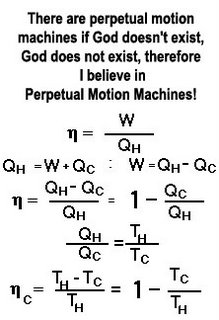 Atheism (a=lack of or negation, theism=belief in God/gods) is a lack of belief in a God or gods.
Atheism (a=lack of or negation, theism=belief in God/gods) is a lack of belief in a God or gods.The atheist either denies that there is a God or gods (strong atheism), or denies that there is a ground for theism (weak atheism).
Atheism is not about knowledge, but about belief. The strong atheist simply believes that it is impossible for there to be a god. The weak atheist believes that unless theism can be proved in some way then atheism is the preferred position. Weak atheism is sometimes confused with agnosticism; this is a natural conclusion because in application and practice there is little difference. The word agnosticism is derived from the Greek a- (negation) and -gnosis (knowledge). Simply put, an agnostic is one who says: "I don't know".
Both weak atheism and agnosticism are victims of the logical fallacy called “Appeal to Ignorance.” An appeal to ignorance is an argument for or against a proposition on the basis of a lack of evidence against or for it. If there is positive evidence for the conclusion, then of course we have other reasons for accepting it, but a lack of evidence by itself is no evidence.
The atheist will sometimes try to wiggle out of this difficulty by claiming that it is reasonable to argue from a lack of evidence for a proposition to the falsity of that proposition, when there is a presumption that the proposition is false.. Likewise, sometimes the atheist will try reason from premises about what one knows and what one would know if something were true. Clearly, both of these arguments quickly degenerate into circular reasoning. Circular reasoning is any form of argument in which the conclusion occurs as one of the premises, or a chain of arguments in which the final conclusion is a premise of one of the earlier arguments in the chain. Usually, an argument begs the question when it assumes any controversial point not conceded by the other side. In this case, “what one would know if God exists.”
Another tactic the atheist will use is to claim an omniscient completeness of information or make the assumption of reasonably complete information. This is often called the "closed world assumption". Obviously, the claim of omniscient completeness is without merit because claiming omniscience presupposes oneself to be a god. However, when it is reasonable to accept the “closed world assumption”, it may not be a fallacy of appeal to ignorance to reason this way. But when is it reasonable to accept the “closed world assumption?” This assumption can only be validly made when the boundaries of the system or “world” being observed can be clearly delineated and external factors isolated. Certainly, it is difficult if not impossible to clearly delineate, without presupposing the thesis, the boundaries of the universe or isolate it from external factors, i.e. God. As weak as this tactic is, the methodological naturalist understands it is the most stable sand upon which he can build his foundation and place his faith in.
In the words of Paul Draper, naturalism is “the hypothesis that the physical universe is a ‘closed system’ in the sense that nothing that is neither a part nor a product of it can affect it. So naturalism entails the nonexistence of all supernatural beings, including the theistic God.”
If upon this sand is where the methodological naturalist wishes to build his religious home, then upon it they must stand to face the storms of conflicts, paradox, and dilemmas that accompany it.
Van Wylen and Sonntag, in the college textbook Fundamentals of Classical Thermodynamics say:
The final point to be made is that the second law of thermodynamics and the principle of the increase of entropy have philosophical implications. Does the second law of thermodynamics apply to the universe as a whole? Are there processes unknown to us that occur somewhere in the universe, such as “continual creation,” that have a decrease in entropy associated with them, and thus, offset the continual increase in entropy that is associated with the natural processes that are known to us? If the second law is valid for the universe (we of course do not know if the universe can be considered as an isolated system), how did it get in the state of low entropy? On the other end of the scale, if all processes known to us have an increase in entropy associated with them, what is the future of the natural world as we know it?
Quite obviously it is impossible to give conclusive answers to these questions on the basis of the second law of thermodynamics alone. However, we see the second law of thermodynamics as a description of the prior and continuing work of a creator, who also holds the answer to our future destiny and that of the universe.
Of course, as stridently as many modern scientists claim to hold fast to that shifting sand, they know, and all of society unconsciously knows, that they have lost their logical moorings. The only escape is an escape from reason and that is what they have done. Francis Schaeffer explains this best in the book Escape from Reason:
Man is dead. God is dead. Life has become meaningless existence, man a cog in a machine. The only way of escape lies in a nonrational fantasy world of experience, drugs, absurdity, pornography, an elusive "final experience," madness...
A million so-called scientists can in irrational rage continue to ridicule and claim with authority that Intelligent Design is not science, but that does nothing to justify their own religion of self worship.
"In questions of science, the authority of a thousand is not worth the humble reasoning of a single individual." [Galileo Galilei]
No comments:
Post a Comment